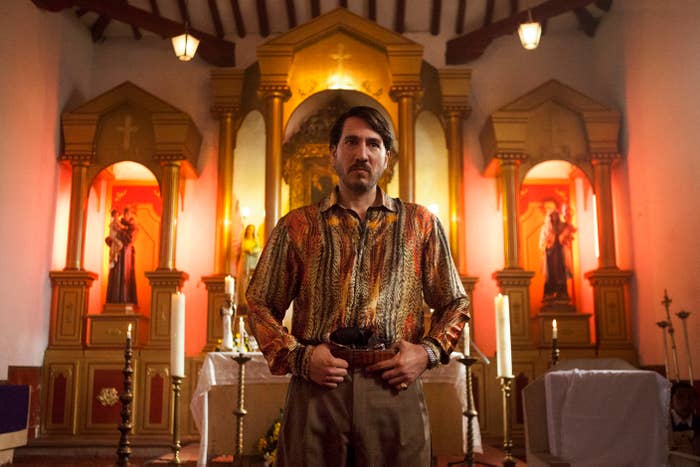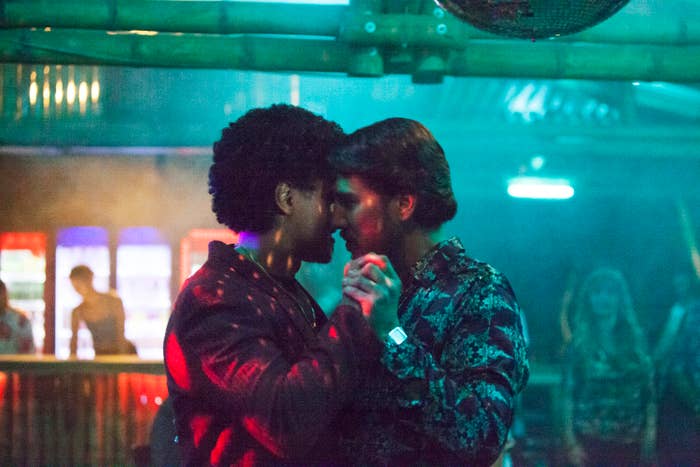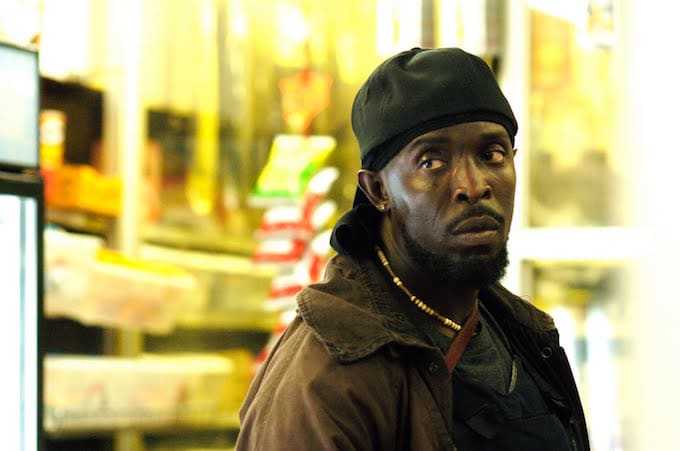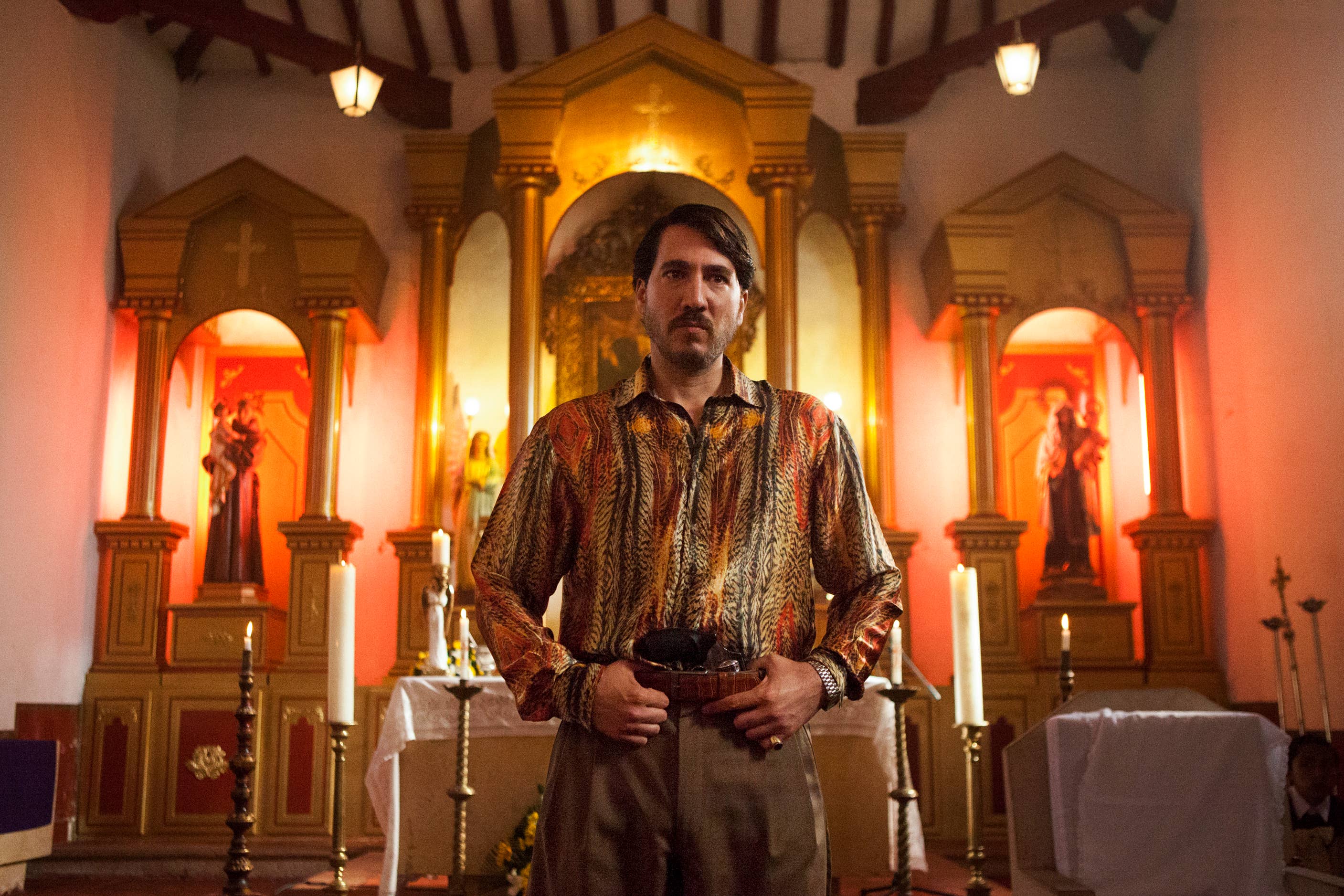
Although it is ostensibly a somewhat fictionalized history lesson on the rise of America’s drug trade with Latin America, Netflix’s drama Narcos is really a story about power—specifically how you get it, keep it and use it to make others do your bidding.
This message is exemplified again in the third season, which hits the streaming site on September 1. Toward the end of the first episode, Cali Cartel don Helmer "Pacho" Herrera, resplendent in a silk paisley button-down that only the 1990s can justify, gives a crowd of late-night revelers an immediate and collective adrenaline rush as he glides off his motorcycle and saunters into their nightclub. No one dares blink as the camera follows him through the joint; they know not showing this kind of respect will come with dastardly consequences.
After being comped a bottle of liquor and getting his choice jam in the speakers, Pacho does something that just fucking double-dog dares someone to come at him: He sensually salsas cheek to cheek, hip to hip and (most importantly) mouth to mouth with his dance partner, another man.
Then he violently murders an adversary.
“It was a way to show how crazy this guy could be and a little dessert before [the kill],” says actor Alberto Ammann, who has played Pacho since the show’s first season but who didn’t really get to explore his sexuality until now as his part had been smaller in the previous years that concentrated on the take-down of Medellin drug lord, Pablo Escobar. (According to investigative reporter William C. Rempel’s book, At the Devil's Table: The Untold Story of the Insider Who Brought Down the Cali Cartel, the real Pacho was out, proud and oversaw the group’s most gruesome deaths).
“When you saw the girls and guys watching the couple dancing and kissing, there’s so much in their looks,” Ammann adds of his dance routine with actor Maurho Jimenez Mora. “Nobody laughs or moves a hair because they know this guy is terrible and very violent and he’s doing this for respect and to shut up everyone.”

This view of LGBTQ men commanding some sort of reverence has been building for awhile on television. Andre Braugher has received multiple Emmy nominations for playing NBD-he’s-gay Captain Holt on Fox comedy Brooklyn Nine-Nine and the bisexuality of Dean Norris’ Uncle Daddy on TNT’s new Southern mafia dramedy, Claws, is handled with such a laissez faire attitude that I almost forgot to mention it. Stephen Moyer once told me that creator Kurt Sutter decided to have his lead villain in the short-lived (and incredibly bloody) The Bastard Executioner be sexually ambiguous because “sex is power.”
It wasn’t always this way. Programs like HBO’s Oz and The Sopranos frequently showed this as a weaknesses that enemies would try to exploit (the latter had Frank Vincent’s Phil Leotardo quite literally emerge from a closet and tell Joseph R. Gannascoli’s Vito Spatafore he’s a “fucking disgrace” for being gay before his goons pummel him to death). The original Dynasty was rife with homophobia (something the upcoming reboot on The CW has done without). Even more recent shows like Fox’s Empire haven’t been immune to this, on screen or off.
And then there’s Omar Little. The gay, Robin Hooding stick-up man whom Michael K. Williams portrayed on HBO’s The Wire was revolutionary when the show debuted in 2002. Creator David Simon, who famously modeled many of the show’s characters on his past life as a crime reporter, told The Guardian in 2008 that it worked for Omar to be gay because he was more of a lone wolf and therefore “could be boldly and openly homosexual in a way that a gay man within the organized drug trade or within the police department could not be." But it was still a liability. Rivals Stringer Bell (Idris Elba) and Avon Barksdale (Wood Harris) increased the bounty on his head when they found out this piece of information. When Omar sees just how badly they’ve tortured and murdered his partner, Brandon, (Michael Kevin Darnall), his wails reverberate through the morgue.

Pacho, however, has a crew. The three other leaders of the Cali Cartel don’t care who he takes to bed as long as he keeps up his portion of their operation. And that support only serves to bolster the emotional force field that surrounds him as he charges at nemeses.
This is especially crucial given that this season of Narcos is set in the mid-1990s: An era that was not always friendly to the LGBTQ community.
“I think so many young people don’t remember that time, and how difficult, and how hard it was to be yourself, and authentic in the world, particularly if you were gay and a disrupter and a pathfinder,” Showrunner Ryan Murphy reminded journalists at Television Critics Association in August. He was speaking to promote his upcoming FX miniseries about the unfortunate death of another out 20th century gay man (albeit one who exemplified a much more legitimate definition of power), The Assassination of Gianni Versace: American Crime Story.
Actor Ammann similarly argues to Complex that Pacho’s legacy of staunch openness is “brave.”
“We have a lot of problems with this stupid discrimination around the world,” he says. “In the narcos world, it had never happened in this way with a boss in a cartel. That made this character so interesting to me and a way to understand how far this guy could go.”
And he’s right. Pacho may have been a blood-thirsty monster and the coming-out story he reflects upon during this season ain’t exactly rosy, but Narcos’ depiction of him is an important part of LGBTQ representation on TV. Just as there has long been a charge within the LGBTQ community against characters who are villains simply because of their orientation, there is also a stereotype that the Latino community wouldn’t understand or appreciate seeing a strong portrayal of an LGBTQ person.
“A lot of times, producers make assumptions about their viewers and the reality is that a lot more Latinos are coming out to their families,” says Monica Trasandes, GLAAD’s director of Spanish language and Latinx media & representation, which last year offered its first study of LGBTQ characters on Spanish-language TV shows in the U.S. “They’re basing their viewership or production decisions on a bit of a stereotype: That Latinx people don’t care about LGBT issues or that it’s not talked about. I think they’re going to start seeing a big change when LGBTQ Latinx people and their families go away from traditional broadcast and toward shows on Netflix and other platforms that are more inclusive.”
She adds that she always stresses to producers that these characters don’t “always have to be the hero;” rather let their gender or sexuality “be a part of who they are. And if they happen to be the villain that you’ve written, then that’s fine.”
Judging by the body count Pacho amasses this season, the Narcos writers have done just that.

